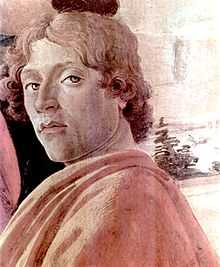Adoration of the Magi of 1475 (Botticelli)
_-_Uffizi.jpg) | |
| Artist | Sandro Botticelli |
|---|---|
| Year | c. 1475–1476 |
| Type | Tempera on panel |
| Dimensions | 111 cm × 134 cm (44 in × 53 in) |
| Location | Uffizi, Florence |
The Adoration of the Magi is a painting by the Italian Renaissance master Sandro Botticelli, dating from 1475 or 1476. It is housed in the Uffizi of Florence. Botticelli was commissioned to paint at least seven versions of The Adoration of the Magi.[1]
The Adoration of the Magi theme was popular in the Renaissance Florence. The work was commissioned by Gaspare di Zanobi del Lama, a banker of humble origins and dubious morality connected to the House of Medici, for his chapel in the church of Santa Maria Novella (now destroyed). In the scene are present numerous characters among which are several members of the Medici family: Cosimo de' Medici (the Magus kneeling in front of the Virgin, described by Vasari as "the finest of all that are now extant for its life and vigour"), his sons Piero (the second Magus kneeling in the centre with the red mantle) and Giovanni (the third Magus), and his grandsons Giuliano and Lorenzo. The three Medici portrayed as Magi were all dead at the time the picture was painted, and Florence was effectively ruled by Lorenzo.
In his Lives Vasari describes the Adoration in the following way:
"The beauty of the heads in this scene is indescribable, their attitudes all different, some full-face, some in profile, some three-quarters, some bent down, and in various other ways, while the expressions of the attendants, both young and old, are greatly varied, displaying the artist's perfect mastery of his profession. Sandro further clearly shows the distinction between the suites of each of the kings. It is a marvellous work in colour, design and composition."
Del Lama is portrayed as the old man on the right with white hair and a light blue robe looking and pointing at the observer. In the picture is also present Botticelli's alleged self-portrait, as the blond man with yellow mantle on the far right.
The attention to details, such as the garments rendering, show the acquisition by the Florentine artist of the influences from the Flemish school at this point of his career.
See also
| Wikimedia Commons has media related to Adoration of the Magi by Botticelli (Uffizi). |
- Adoration of the Magi (Filippino Lippi)
- Adoration of the Magi (Leonardo da Vinci)
References
- ↑ "Adoration of the Magi". Mountain West Digital Library. Utah Academic Library Consortium. Retrieved 15 May 2013.
Bibliography
- Zöllner, Frank (2005). Sandro Botticelli. Prestel-Verlag. ISBN 3791332732.
- Page at artonline.it (Italian)
